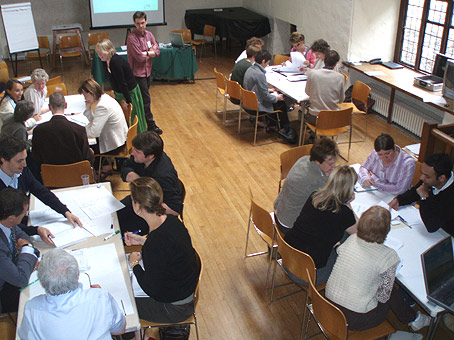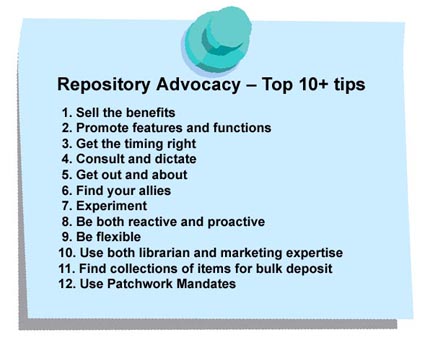Repositories Support Project Summer School
The Repositories Support Project (RSP) is a major initiative from JISC to support the development and growth of the repositories network in the UK [1]. With its first major event the RSP team offered 23 prospective and new repository managers from Higher Education institutions across the UK the opportunity to participate in an intensive 48-hour repository summer school. Held at the inspirational and delightful Dartington Hall in Devon, this three-day residential course delivered a comprehensive overview of the practical challenges and solutions to effective repository implementation.
Day 1
Making the Business Case for Repositories
The summer school kicked off with a warm welcome from Chris Pressler, Dean of Information and Learning at Dartington College, followed by an overview of the aims and objectives of the summer school delivered by the RSP Project Manager, Bill Hubbard from SHERPA, based at the University of Nottingham. Bill summarised the preparatory work that had been completed by those attending the course and outlined how the summer school hoped to address their key concerns. Common points of interest that the programme was designed to address were a better understanding of the issues involved with repositories such as creating successful advocacy campaigns and dealing with copyright and other intellectual property rights (IPR) issues, along with the need to network with others involved in repository work to develop a sense of community.

Figure 1: Dartington Hall
The main event of day one was a keynote presentation by Alma Swan of Key Perspectives Ltd [2] who delivered an overview of some of the barriers and drivers relating to institutional repositories and explored the concepts of making a business case and strategic planning. Alma covered a huge amount of material during her talk including a look at key stakeholders, barriers and drivers from different stakeholder perspectives and some practical suggestions when it came to addressing strategic planning for repositories. The session offered a high level of detail for participants and was particularly successful in summarising the breadth of issues repository managers need to embrace. The presentation was followed up with a discussion session asking participants to consider the key questions they need to ask at the planning, pilot, launch and evaluation stages of repository implementation. The first day closed with a networking opportunity over dinner which was followed by Chris Pressler leading a very welcome stroll around the spectacular gardens at Dartington. The rain just about held off long enough for us to be able to relax and enjoy the varied features such as a Henry Moore sculpture and the medieval terraces and tiltyard, originally used for jousting tournaments.

Figure 2: Dartington Hall Gardens
Day 2
Software
Day two of the summer school began bright and early with a session on the software options for repositories led by Les Carr of University of Southampton and Chris Yates of University of Wales Aberystwyth. Beginning with a review of what a repository is all about, Les brought together information about the types of content that might brought into institutional repositories, a look at repository directory services such as OpenDOAR [3] to encourage participants to stay curious about what others are doing with their software, and a summary of some of the constraints that might influence software choices. Les and Chris then led the audience through a series of comparative demonstrations of functionality within two key open source repository software solutions, DSpace [4] and EPrints.org [5]. The demonstrations highlighted some useful case studies and explored the potential of software solutions to deal with and present different types of repository content.

Figure 3: DSPace at Loughborough [6]
![screenshot (94KB) : EPrints at Southampton [7] screenshot (94KB) : Figure 4: EPrints at Southampton](/images/issue52-rsp-summer-sch-rpt/screenshot2.jpg)
Figure 4: EPrints at Southampton [7]
Metadata and Workflow
After a very welcome coffee break it was time to get practical with a hands-on exploration of metadata and submission workflows. This session was my own contribution to the summer school and after delivering a short presentation on the theory behind metadata I asked the participants to work together to create some actual metadata. Each of the four groups were given typical repository content - a journal article, a book chapter, a thesis or a conference paper - and they were asked to set up a metadata scheme for their items using just pen and paper.

Figure 5: Metadata Groupwork
Once the groups had come up with their metadata scheme they were then asked to consider submission workflow within a repository and consider which elements of metadata they had identified would be completed by academics and which elements were more likely to be completed by repository managers or administrators. The practical exercises stimulated lots of discussion, in particular highlighting the problems with using the simple Dublin Core metadata standard [8] and were a useful opportunity for participants to explore a key concern with regards to repository management. Many delegates indicated that they would be returning home and repeating the same exercises with their local cataloguing experts.
| Metada and workflow practical - Book Chapter | ||
| Field label | DC tag | Content |
| Author M | dc:contributor.author | Nancy Armstrong |
| Editor | dc:contributor.editor | Ellen Rooney |
| Chapter title M | dc:title | What feminism did to visual studies |
| Book title | dc:relation.ispartof | Feminist Literary Theory |
| Publisher M | dc:publisher | Cambridge University Press |
| Publisher | dc:publisher.place | Cambridge |
| Date M | dc:date.issued | 2006 |
| ISBN | dc:identifier.isbn | 0-521-00168-4 |
| Abstract M | dc:description.abstract | Chapter considers the effect of the advent of fem... |
| Subject | dc:subject.class | PN 98 W64 C1 |
| M - Mandatory Fields Workflow 1 - Author/submitter enters metadata 2 - Manager checks for new items - Checks metadata entries (cataloguing staff) - Enters additional metadata (cataloguing staff) - Checks for copyright clearance (rights officers) | ||
Figure 6: Metadata Practical Exercise Results
Copyright and Legal Issues
After lunch we turned our attention to the thorny issues of legal matters and repository policies. Jane Smith of the University of Nottingham gave a presentation on copyright matters in repositories covering aspects such as self-archiving and publisher policies to dealing with embargoes and mandates. Particular copyright problems were highlighted by looking at non-print media and learning objects in repositories. The session closed with a demonstration of the Romeo [9] and Juliet [10] services, which are directories of publisher self-archiving policies and funding council mandates respectively, and both core tools for repository managers to engage with.
Policy Framework
The session on policy frameworks was led by Bill Hubbard who gave an overview of the policy environment in Higher Education in a wider sense before drilling down and covering the policy options that repository managers need to consider. To support the theory, the audience was then shown a brief demonstration of the OpenDOAR policies tool [11] which can be a particularly useful way for repository managers to assemble a repository policy document quickly. The session ended with a presentation by Steve Hitchcock of the University of Southampton on the importance of preservation planning in relation to policies and the need for repositories at least to consider preservation, even if they don't feel they will actually be doing any actual preservation in the long run themselves. Day two was drawn to a close with a panel session and question and answers. Despite showing initial signs of information overload and flagging energy levels, several interesting themes emerged from the discussion most notably the relationship between repositories and Web 2.0 technologies.
Day 3
Populating Repositories and Developing Marketing Strategies
Day three again saw the participants catching an early breakfast before settling in for an inspirational presentation on advocacy strategies given by Sally Rumsey the Research Archive Manager for Oxford University [12]. Sally re-enforced the messages from previous sessions looking at stakeholders and issues with repositories before outlining some specific ideas for publicity and marketing channels that participants may wish to use to promote the use of their repository.

Figure 7: Repository Advocacy - Sally Rumsey's Top Ten+ Tips [text-only version]
The high level of practical advice in Sally's talk was particularly appreciated by the audience and a break out session that then followed saw people take inspiration from Sally's talk and work together in small groups on a practical exercise creating plans for a marketing strategy for a specific stakeholder group within Higher Education.

Figure 8: Marketing Strategy Groupwork
The summer school closed with a final report-back and discussion session where RSP staff indicated their intent to keep in touch with the summer schoolers and ask them to report back their progress at 4- and 8-month intervals by filling out questionnaires and attending a follow up meeting.
Conclusion
The summer school provided an excellent opportunity to participate in a range of interactive seminars, practical workshops, lectures and panel sessions. Participants were able to engage in scholarly debates on current repository theory and gain hands-on experience with repository software and tools. We certainly felt a sense of a community being established among delegates, helped in part by the feeling of being away from the pressures of daily working life and meeting people in similar situations in an inspirational environment. Lots of positive feedback has already been received:
'I have learnt more from this single event that I have from 2 months of looking up IR sites'
'Each session gave me pieces of information to take away - a web site here, a name there, an idea, a process. Really useful'
'I feel well prepared to take our repository forward and if I don't know what to do I know I've got support from RPS and participants at the event.'
Our overall impression was that the attendees left feeling enthused and that they were ready to return to their institutions to prepare for their repositories' implementation of the various things they had learnt. The RSP intends to run the summer school again in 2008 and we are now taking details of people who would like be part of the next cohort; to register your interest please contact me on the email address below.
References
- RSP Web site http://www.rsp.ac.uk/
- Key Perspectives Web site http://www.keyperspectives.co.uk/
- OpenDOAR Web http://www.opendoar.org/
- DSpace Web site http://www.dspace.org/
- Eprints Web site http://www.eprints.org/
- Loughborough University Institutional Archive https://dspace.lboro.ac.uk/dspace/
- SERPENT Image and Video Footage Database at Southampton University http://archive.serpentproject.com/
- Dublin Core Web site http://dublincore.org/
- Romeo Web site http://www.sherpa.ac.uk/romeo.php
- Juliet Web site http://www.sherpa.ac.uk/juliet/index.php
- OpenDOAR Policies Tool http://www.opendoar.org/tools/en/policies.php
- Oxford Research Archive http://ora.ouls.ox.ac.uk/access/
